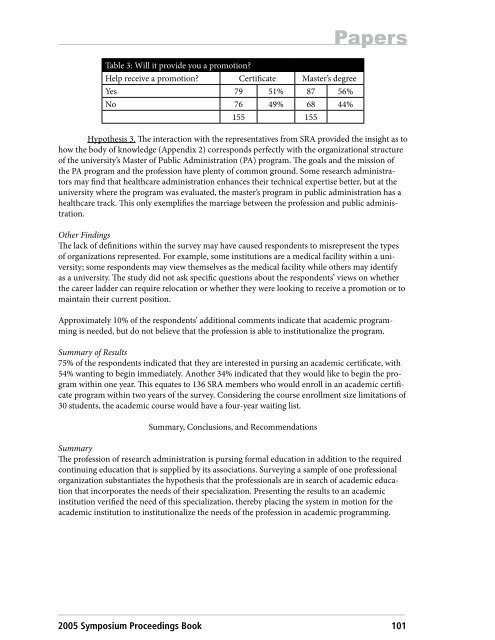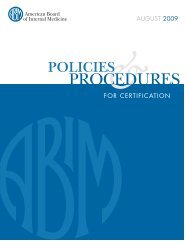The SRA Symposium - College of Medicine
The SRA Symposium - College of Medicine
The SRA Symposium - College of Medicine
Create successful ePaper yourself
Turn your PDF publications into a flip-book with our unique Google optimized e-Paper software.
Table 3: Will it provide you a promotion?<br />
Help receive a promotion? Certificate Master’s degree<br />
Yes 79 51% 87 56%<br />
No 76 49% 68 44%<br />
155 155<br />
Hypothesis 3. <strong>The</strong> interaction with the representatives from <strong>SRA</strong> provided the insight as to<br />
how the body <strong>of</strong> knowledge (Appendix 2) corresponds perfectly with the organizational structure<br />
<strong>of</strong> the university’s Master <strong>of</strong> Public Administration (PA) program. <strong>The</strong> goals and the mission <strong>of</strong><br />
the PA program and the pr<strong>of</strong>ession have plenty <strong>of</strong> common ground. Some research administrators<br />
may find that healthcare administration enhances their technical expertise better, but at the<br />
university where the program was evaluated, the master’s program in public administration has a<br />
healthcare track. This only exemplifies the marriage between the pr<strong>of</strong>ession and public administration.<br />
Other Findings<br />
<strong>The</strong> lack <strong>of</strong> definitions within the survey may have caused respondents to misrepresent the types<br />
<strong>of</strong> organizations represented. For example, some institutions are a medical facility within a university;<br />
some respondents may view themselves as the medical facility while others may identify<br />
as a university. <strong>The</strong> study did not ask specific questions about the respondents’ views on whether<br />
the career ladder can require relocation or whether they were looking to receive a promotion or to<br />
maintain their current position.<br />
Approximately 10% <strong>of</strong> the respondents’ additional comments indicate that academic programming<br />
is needed, but do not believe that the pr<strong>of</strong>ession is able to institutionalize the program.<br />
Summary <strong>of</strong> Results<br />
75% <strong>of</strong> the respondents indicated that they are interested in pursing an academic certificate, with<br />
54% wanting to begin immediately. Another 34% indicated that they would like to begin the program<br />
within one year. This equates to 136 <strong>SRA</strong> members who would enroll in an academic certificate<br />
program within two years <strong>of</strong> the survey. Considering the course enrollment size limitations <strong>of</strong><br />
30 students, the academic course would have a four-year waiting list.<br />
Summary, Conclusions, and Recommendations<br />
Papers<br />
Summary<br />
<strong>The</strong> pr<strong>of</strong>ession <strong>of</strong> research administration is pursing formal education in addition to the required<br />
continuing education that is supplied by its associations. Surveying a sample <strong>of</strong> one pr<strong>of</strong>essional<br />
organization substantiates the hypothesis that the pr<strong>of</strong>essionals are in search <strong>of</strong> academic education<br />
that incorporates the needs <strong>of</strong> their specialization. Presenting the results to an academic<br />
institution verified the need <strong>of</strong> this specialization, thereby placing the system in motion for the<br />
academic institution to institutionalize the needs <strong>of</strong> the pr<strong>of</strong>ession in academic programming.<br />
2005 <strong>Symposium</strong> Proceedings Book 101

















